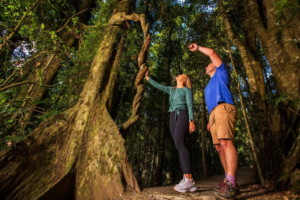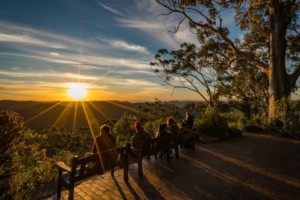What to keep, change, do in a crisis (and why we should give a sh*t)
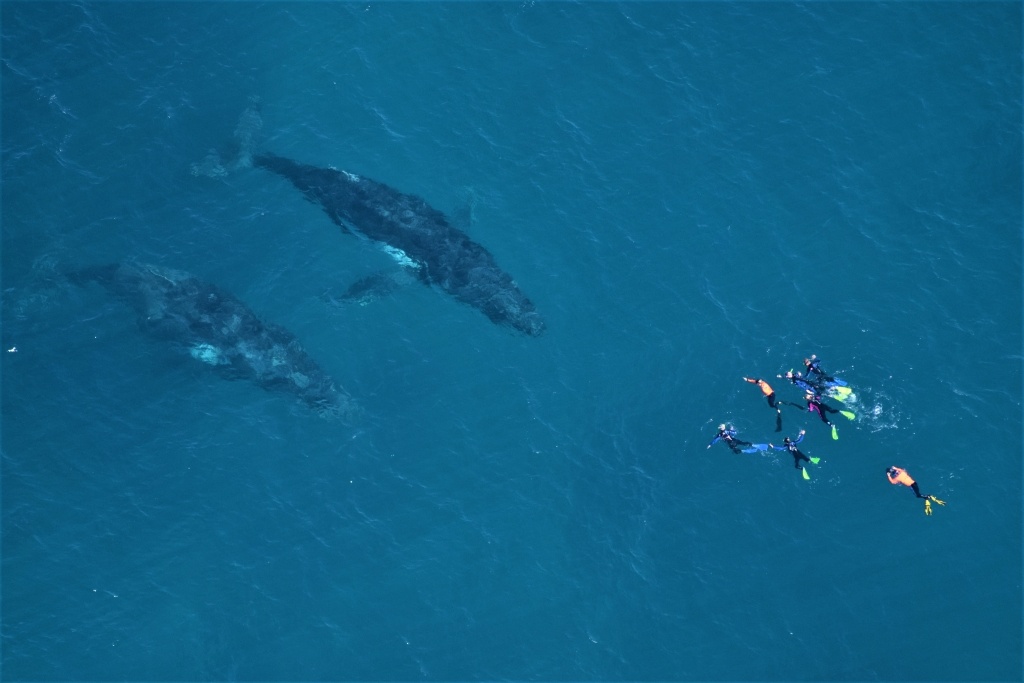
Sonia Beckwith’s tiny Australian ecotourism operation Live Ningaloo faced an existential crisis in 2020, like so many travel & tourism businesses globally did (and still do). In this “Good Tourism” Insight, her second, Ms Beckwith shares the value of caring — a lot! — and how she harnesses and sustains it.
When my partner and I founded our micro tourism business Live Ningaloo in 2016, we were full of beans, determined to challenge the long-held belief that mass tourism is the only way to carve out a sustainable existence in the tourism experience sector.
Our small group model was a strategic decision. It allowed our staff to learn more about each guest during the booking process and throughout the day, and gave them the opportunity to tailor messaging making the experience much richer for individuals.
We called it the “Give a Sh*t Factor”. Ours is high. Maintaining our level of care every day for seven months on tour and 12 months in the office took great effort. It was draining but the results were staggering. By the start of 2020 (pre-COVID-19) 50% of our clientele came directly from referrals. We had enough interest to diversify our products. And we were the busiest (and most expensive) operator in the region.
Anecdotally we also learnt that our guests were making more conscientious purchase decisions after their experience with us. They were trying different things to reduce their footprint. And they kept a finger on the pulse; remained concerned about the health of Ningaloo Reef (where we operate).
Then COVID-19 happened. It was the most challenging time, but we wanted to stay true to form and treat guests individually; hold their hands through the cancellation and refunding process. It gave us an opportunity to talk to them individually too. We begged our clients to take a gift card or rebook. Over 40% stuck it out with us.
Also see Sonia Beckwith’s first “GT” Insight
“When the odds are against you: How a small tour operator survived 2020”
The process temporarily broke me. I felt I was swirling in an emotional sea of unknowns. Waves that once felt exhilarating and even calming at times (think washing over the beach) became waves of doubt that threatened to capsize everything we had built.
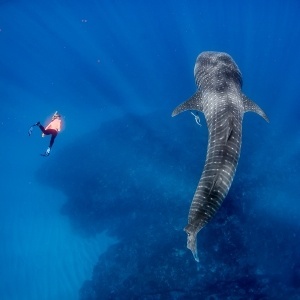
It forced us to go back to the drawing board.
With critical reflection we realised our sustainable operation wasn’t nearly as sustainable if one of us was taken out of commission. We needed both of us to be focused, 100% of the time, to keep it going. We had an everything-on-the-table moment in which we brainstormed ideas about what we needed to:
- keep to maintain our “why”,
- change to keep us safe financially, and
- do to thrive in the long term.
Here were our main takeaways:
1. No one can take care of us like we can
We had to apply the “Give a Sh*t Factor” to ourselves and our business as well as our guests and customers. It was our responsibility to reach out to the government bodies and organisations representing our industry. Even if we weren’t offered a seat at the table, we were at least able to put our foot in the door or occupy enough space in the room to spark discussion.
It’s easy to identify problems but it takes effort to illustrate their impact with numbers and to come up with potential solutions. I would recommend taking time to collect your thoughts in writing and regularly communicate with as many relevant people as possible to keep them updated. The process will also help you work through any changes you need to make internally.
2. Be prepared to do things differently
We identified that we spend a heap of time in the office. COVID forced me to gain extra employment so all of the time I previously allocated to keeping things tight and right wasn’t going to be available. Through brainstorming we came up with ways to spread the work among our staff to maintain our service standards. We opted for a combination of adding more structure around fixed items (such as accounting), sharing the load internally, and hiring a virtual assistant to create more bandwidth. We also took time to scrub our systems and determined that with a few tweaks we could save time through reorganisation and automation. We use Monday.com a lot, but several other productivity apps are on the market (Asana, Trello, etc.).
3. Try new things
Trying new things is scary, especially in a post-COVID environment, but if you can’t try them now, when can you? So long as you approach the new thing you’re implementing strategically and with thoughtfulness, go for it! You may discover something amazing comes from the switch.
Also see Grant Charlesworth’s “GT” Insight
“What travellers want post-COVID & how to prepare your tour business”
For us it was deciding I was going to take on another job. In addition to the extra income that has kept us going through a volatile time, stepping away from tasks we could delegate and outsource has allowed me the space to focus on things I want to do within our business rather than things I have to do. It may not be a new thing we keep forever, but it has been a good move so far, and will likely remain so for the next 18 – 24 months.
4. Rest
The only way to consistently offer a great product, no matter the industry, is to take adequate time to rest. It’s something we have been terrible at. Daily balance doesn’t exist for us. A highly seasonal business means we go-go-go when the season is on, and catch up on everything else in the dry time.
We’ve found it helpful to block out real down time between the waves to rest and reset throughout the year. We’ve also learnt the signs of what fatigue looks like in ourselves, in each other, and in our staff in order to head it off early. For example, as soon as I’m feeling uninspired or lack motivation, I work in immediate downtime. It has been such a saver to curb fatigue once I realised what it looked like for me.
5. Practice being vulnerable and brave
The “Give A Sh*t Factor” now bleeds into every part of our lives. It requires us to be intentional about our thoughts, actions, and what we say. Do we make mistakes? You betcha we do, but that really isn’t the point. Embracing who you are and your “why” is so important, and learning how to transparently communicate your purpose prevents slip ups and allows you space to work on a problem if a mistake does occur. The method also forces us to better our best; to push for great, not just getting something over the line. It’s why people trust us and want to spend their money and time with us, and we take it seriously.
The points above have kept our passion alive and strong through one of the toughest periods of our business and will keep us ticking along well after.
Bottom line: if you don’t give a sh*t, you shouldn’t be here.
What do you think? Share a short anecdote or comment below. Or write a deeper “GT” Insight. The “Good Tourism” Blog welcomes diversity of opinion and perspective about travel & tourism because travel & tourism is everyone’s business.
Featured image (top of post): A Live Ningaloo tour group encounters humpback whales. Photo by Ningaloo Aviation & Jacob Hill supplied by Live Ningaloo.
About the author
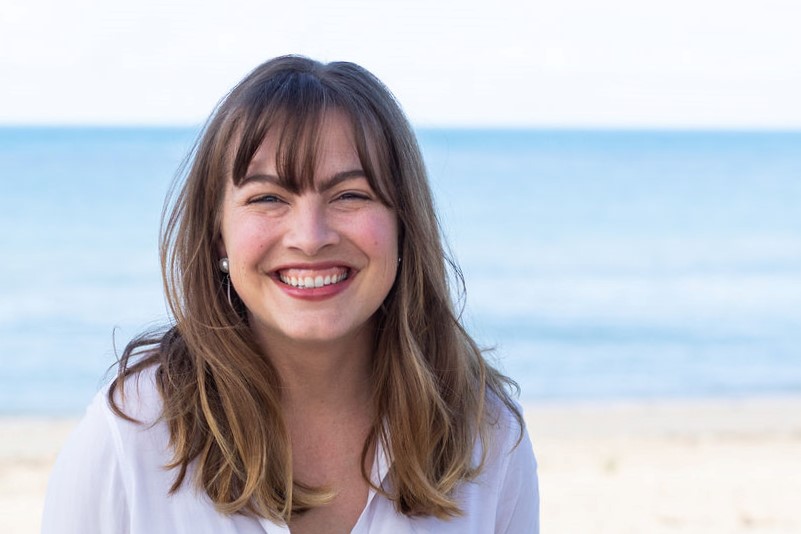
After adventuring in Australia, in 2016 Sonia Beckwith settled with her partner in remote Exmouth, Western Australia to start ecotourism company Live Ningaloo.
Born and raised in the USA, Ms Beckwith has worked in all sorts of roles, including communications, project management, customer relationship management, and general management in the not-for-profit, private, and corporate sectors.
In her own words: “It’s my personal mission to help others move the needle every day in their tourism and business endeavours. I’m interested in bringing people to the table who would normally not dine together. I believe in strengthening communication between like minds and opposing views, then finding a way to work together to achieve something.
“If you are a mover and shaker you’ll like me, if you aren’t, you’ll at least be entertained.”



